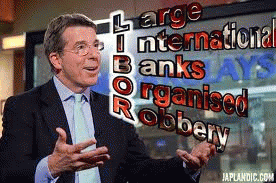The article about the Libor scandal, co-authored with Nomi Prins, received much attention, with Internet repostings, foreign translation, and video interviews. To further clarify the situation, this article brings to the forefront implications that might not be obvious to those without insider experience and knowledge.
The price of Treasury bonds is supported by the Federal Reserve's large purchases. The Federal Reserve's purchases are often misread as demand arising from a "flight to quality" due to concern about the EU sovereign debt problem and possible failure of the euro.
Another rationale used to explain the demand for Treasuries despite their negative yield is the "flight to safety." A 2% yield on a Treasury bond is less of a negative interest rate than the yield of a few basis points on a bank CD, and the US government, unlike banks, can use its central bank to print the money to pay off its debts.
It is possible that some investors purchase Treasuries for these reasons. However, the "safety" and "flight to quality" explanations could not exist if interest rates were rising or were expected to rise. The Federal Reserve prevents the rise in interest rates and decline in bond prices, which normally result from continually issuing new debt in enormous quantities at negative interest rates, by announcing that it has a low interest-rate policy and will purchase bonds to keep bond prices high. Without this Fed policy, there could be no flight to safety or quality.
It is the prospect of ever lower interest rates that causes investors to purchase bonds that do not pay a real rate of interest. Bond purchasers make up for the negative interest rate by the rise in price in the bonds caused by the next round of low interest rates. As the Federal Reserve and the banks drive down the interest rate, the issued bonds rise in value, and their purchasers enjoy capital gains.
As the Federal Reserve and the Bank of England are themselves fixing interest rates at historic lows in order to mask the insolvency of their respective banking systems, they naturally do not object that the banks themselves contribute to the success of this policy by fixing the Libor rate and by selling massive amounts of interest rate swaps, a way of shorting interest rates and driving them down or preventing them from rising.
The lower is Libor, the higher is the price or evaluations of floating-rate debt instruments, such as CDOs, and thus the stronger the banks' balance sheets appear.
Does this mean that the US and UK financial systems can only be kept afloat by fraud that harms purchasers of interest rate swaps, which include municipalities advised by sellers of interest rate swaps, and those with saving accounts?
The answer is yes, but the Libor scandal is only a small part of the interest rate rigging scandal. The Federal Reserve itself has been rigging interest rates. How else could debt issued in profusion be bearing negative interest rates?
As villainous as they might be, Barclays bank chief executive Bob Diamond, Jamie Dimon of JP Morgan, and Lloyd Blankfein of Goldman Sachs are not the main villains. The main villains are former Treasury Secretary and Goldman Sachs chairman Robert Rubin, who pushed Congress for the repeal of the Glass-Steagall Act, and the sponsors of the Gramm-Leach-Bliley bill, which repealed the Glass-Steagall Act. Glass-Steagall was put in place in 1933 in order to prevent the kind of financial excesses that produced the current ongoing financial crisis.
President Clinton's Treasury Secretary, Robert Rubin, presented the removal of all constraints on financial chicanery as "financial modernization." Taking restraints off of banks was part of the hubristic response to "the end of history." Capitalism had won the struggle with socialism and communism. Vindicated capitalism no longer needed its concessions to social welfare and regulation that capitalism used in order to compete with socialism.
The constraints on capitalism could now be thrown off, because markets were self-regulating as Federal Reserve chairman Alan Greenspan, among many, declared. It was financial de-regulation -- the repeal of Glass-Steagall, the removal of limits on debt leverage, the absence of regulation of OTC derivatives, the removal of limits on speculative positions in future markets -- that caused the ongoing financial crisis. No doubt but that JP Morgan, Goldman Sachs and others were after maximum profits by hook or crook, but their opportunity came from the neoconservative triumphalism of "democratic capitalism's" historical victory over alternative socio-politico-economic systems.
The ongoing crisis cannot be addressed without restoring the laws and regulations that were repealed and discarded. But putting Humpty-Dumpty back together again is an enormous task full of its own perils.
The financial concentration that deregulation fostered has left us with broken financial institutions that are too big to fail. To understand the fullness of the problem, consider the lawsuits that are expected to be filed against the banks that fixed the Libor rate by those who were harmed by the fraud. Some are saying that, as the fraud was known by the central banks and not reported, the Federal Reserve and the Bank of England should be indicted for their participation in the fraud.
What follows is not an apology for fraud. It merely describes consequences of holding those responsible accountable.
(Note: You can view every article as one long page if you sign up as an Advocate Member, or higher).






